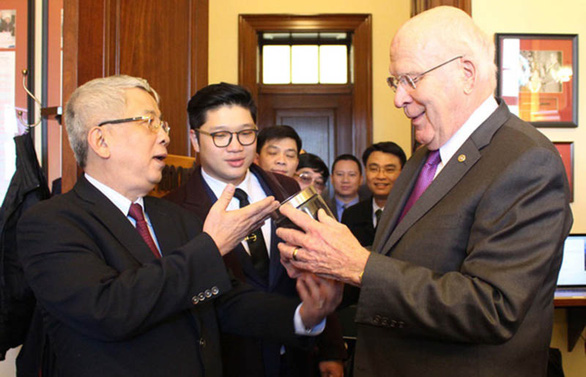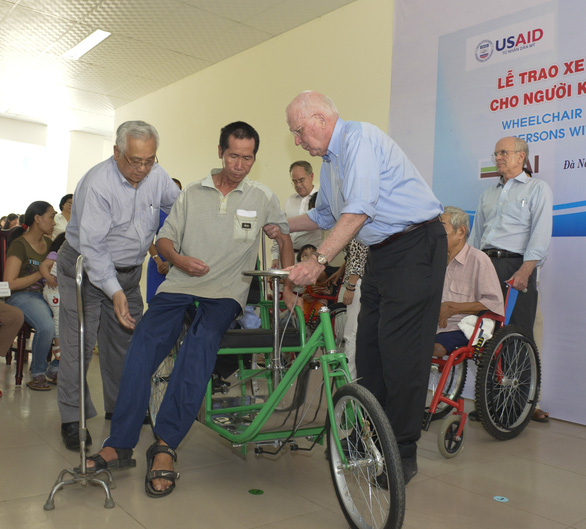Forty-seven years ago, the year that I first took the oath of office as a United States Senator, marked the end of a war that caused immense loss and suffering for the people of both our countries.
I clearly remember that time, as I was the youngest member of the Senate Armed Services Committee when we voted to end the United States war in Vietnam. That vote was not popular in my own state of Vermont. In fact, Vermont’s largest newspaper predicted that because of it I was finished as a politician and would serve only one term.
History turned out differently, and of the more than 17,000 votes I have cast during eight terms in the Senate, that vote in 1975 is one that I am proudest of.
As I have said at other times, we cannot change history, but we can choose a different future – for ourselves, our children, and our grandchildren. Today, two former enemies can take pride in more than 33 years of reconciliation, normalization, and a comprehensive partnership. Next year is the 10th anniversary of that partnership, signed in 2013 by President Obama and President Truong Tan Sang, and what better way to commemorate this anniversary than by elevating our partnership to a strategic one.
How did we get to this point, after a war that was such a catastrophe for both our countries?
It did not happen by itself. It was American veterans of that war – John McCain, John Kerry, Bobby Muller, and others – who led the campaign for reconciliation and normalization.
It was also the Vietnamese people, who wanted to look forward, and not be held back by the past.
The tragic consequences of the war remain with us half a century later. In the United States, I am reminded of that every morning when I drive past the Vietnam Veterans Memorial on my way to the U.S. Capitol Building.
And in Vietnam, which I have visited three times, I am always reminded of the terrible price paid by the people of Vietnam. Every family suffered, and many continue to suffer from the loss of loved ones, as do American families.
 |
| Senior Lieutenant General Nguyen Chi Vinh (left), Vietnam's Deputy Minister of National Defense, presents a box of treated dioxin-contaminated soil at Da Nang International Airport to U.S. Senate President Pro Tempore Patrick Leahy. |
That is what happens in wars. The shooting stops, but the painful legacies and memories remain.
For more than 33 years, I and others in the United States and Vietnam have worked to overcome some of the worst legacies of the war, including locating and identifying the remains of the missing – Americans and Vietnamese – cleaning up areas contaminated with dioxin and unexploded landmines and bombs, and assisting people with disabilities.
By doing so we have brought our countries together, despite our differences, and built a partnership that extends to many other areas of cooperation, including higher education, public health, climate change, and regional security.
When you consider what relations between the United States and Vietnam are like today, 27 years after President Clinton announced the normalization of relations, it is remarkable.
We would never have gotten to where we are if it were not for the willingness of the Government of Vietnam, over the past four decades, to help locate the remains of American missing in action (MIAs). Words cannot adequately describe the importance of that cooperation.
I am very pleased that we are embarking on a new partnership between the U.S. Department of Defense, the U.S. Agency for International Development, and Vietnam’s Ministry of National Defense, to help Vietnam recover the remains of some of its own missing, who number in the hundreds of thousands. Of all the ways we have worked together to address the legacies of the war, this may turn out to be the most meaningful – certainly for the families of the missing – but also for our two governments.
We will continue to assist the many thousands of disabled Vietnamese victims of unexploded ordnance, which began with the Leahy War Victims Fund 33 years ago providing artificial limbs and wheelchairs.
We will continue to help Vietnamese persons with severe cognitive and physical disabilities, and to clean up the sites contaminated with dioxin from Agent Orange. The Bien Hoa Air Base remediation project is of a scale and complexity unlike anything we have done before, and it is indicative of the confidence of both governments in what we can achieve together.
In a time of great uncertainty in the world, we are fortunate to have worked together on war legacy issues all these years. It has not always been easy, but despite our differences – and we have profound differences over the rights and liberties of citizens – it is because of our joint efforts that Vietnam today is one of our closest partners in East Asia.
The next generation of leaders in Vietnam and the United States are too young to remember the war. What will the next 27 years be like for them? Will they continue and expand what we have started, not just on war legacies, but in meeting the growing demand for higher education and clean energy, preparing for future pandemics, and preserving regional peace?
I have a lot of hope for Vietnam, because I have met some of the next generation, in Hanoi, in Da Nang, and in Ho Chi Minh City. They are as intelligent, enthusiastic, curious, and determined to succeed in today’s technologically interconnected world as young people anywhere. They are proud to be Vietnamese, and they want their country to play an active and positive role in East Asia and the world.
In two months, my time as a United States senator will come to an end. My wife Marcelle and I will return to our home in Vermont. But there are others in Congress who will continue the work we have done to bring our two countries together, and they will work to meet the challenges ahead.
For me, helping to create a partnership with Vietnam that is based on trust, friendship, and cooperation has been among the most rewarding things I have done as a U.S. Senator. It has given new meaning to that vote, 47 years ago, to end the war.
Like us on Facebook or follow us on Twitter to get the latest news about Vietnam!


















































